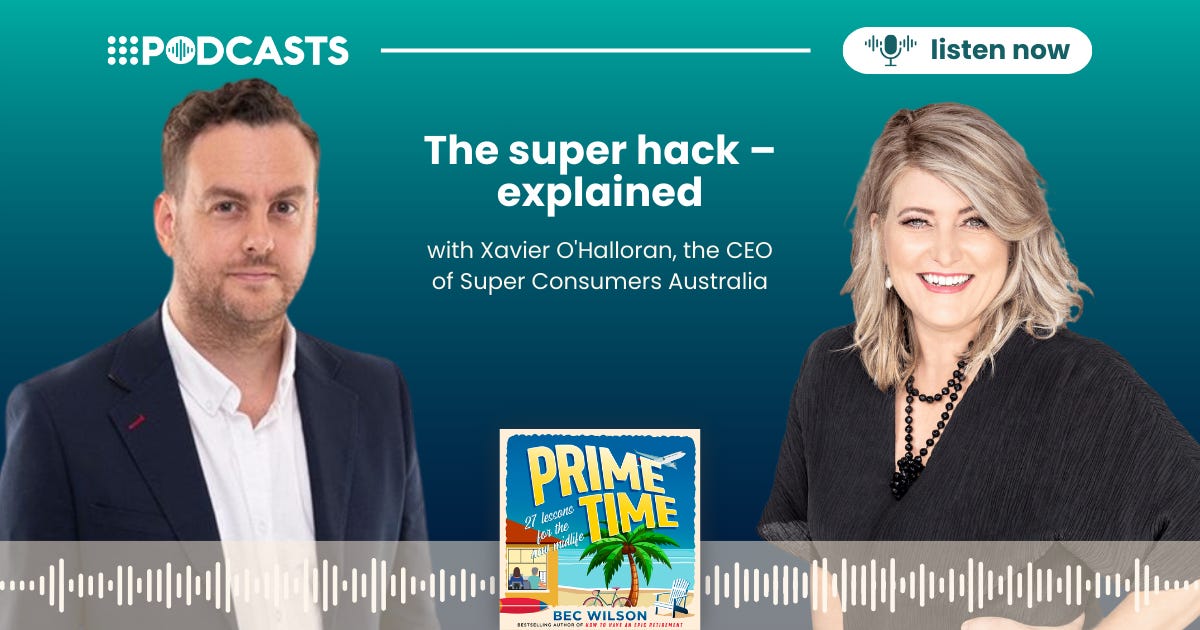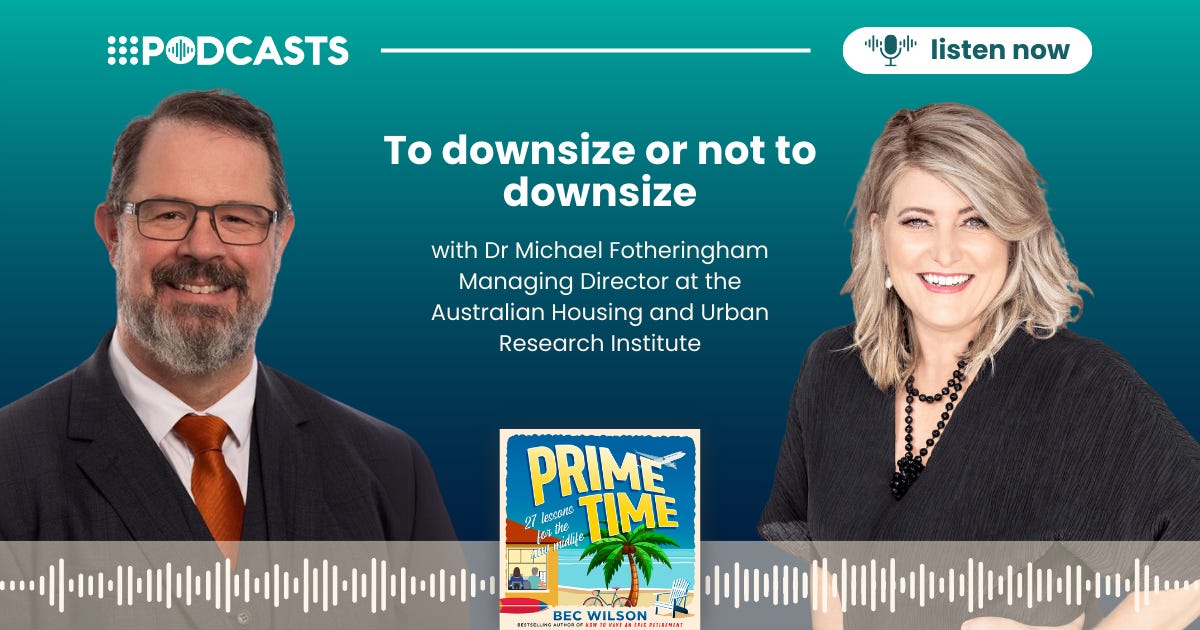What might tariffs mean for your retirement?
And in today's newspapers, 'Hooray for better housing policy – but don’t forget about retirees'
In this week’s edition:
Newspapers: Hooray for better housing policy – but don’t forget about retirees
Feature: What might tariffs mean for your retirement?
Podcast 1: To downsize or not to downsize
Podcast 2: Inside the super hack: what really happened and how to protect yourself
From Bec’s Desk: Happy Easter
What might tariffs mean for your retirement?
You’d be forgiven for wanting to ignore the headlines about US tariffs on Chinese imports. But if those tariffs go ahead in their current shape, the ripple effects could reach your super, your cost of living, and your travel plans sooner than you think.
So today I’d done my homework on how global shifts might show up in our Aussie retirements. And I’d love for you to join in the conversation.
1. Your super will probably feel it
This is one most people are familiar with. A market wobble at the wrong time can hit those looking towards retirement hard. It's called sequencing risk — and it's brutal if you're taking money out during a downturn. I’ve written more about it here.
2. China might flood us with cheap goods
In response to the tariffs, some economists say that China is likely to push its goods into markets like Australia with lower tariffs. That might sound good and it might well be. (cheaper stuff at the shops!). But there can also be a downside to this: local businesses might then struggle to compete, unemployment might rise, and the economy here might soften. Your super is also exposed to those Aussie companies — so again, your investment returns could dip even as the bargain bins fill up. Surprisingly, cheaper stuff at the shops is not always good news.
3. The Aussie dollar is dropping — and your epic retirement holidays just got more expensive
Dreaming of a US road trip? Visiting family in New York or doing the Hawaii thing? The falling Aussie dollar means those dreams now come with a bigger price tag — or you might feel you should delay them. Everything overseas — from flights to hotels to coffee — is more expensive when our dollar is weak. For retirees with international travel on the agenda, that’s a real hit to your lifestyle budget.
4. Central banks are hinting at interest rate cuts — and that’s not all good for retirees
With inflation cooling, central banks (including ours) are preparing to cut rates. That might be a win for mortgage-holders, but it’s a problem if you rely on income from savings, term deposits or annuities — which is a lot of people in retirement. When rates fall, your income often follows. And if you’re about to lock in a lifetime income product, your timing matters.
5. Prices might ease… but not because things are going well
If we start seeing cheaper goods and slowing inflation, don’t assume that’s a win. It might be a sign the global economy is slowing. Less demand. More uncertainty. Slower growth. And that’s not great for retirees who rely on investment returns or want to preserve their nest egg for the decades ahead.
And it’s not just travel or super that’s affected, it’s your weekly shop too. We might get to the point where we see global trade routes disrupted, supply chains get clogged and rerouted. That might drive up shipping costs like we saw in Covid-19, delaying stock, and increasing prices on the things we import — everything from canned tomatoes to the packaging your cereal comes in. Add a weaker Aussie dollar into the mix, and even locally made products can become more expensive to get onto shelves. You might not see a headline about it — but you might ultimately feel it in your trolley.
So, what should you do about it?
Keep your eyes open. Global news is no longer just noise, it’s part of your retirement reality. If you’ve got money in super, plans to travel, or a lifestyle that relies on fixed income, you’re in the game whether you like it or not. So, make sure your setup works in this economy, not the one you planned for five years ago.
Got other ideas or views on where the tariffs might impact retirement? Share them with everyone here in the comments. (I love it when you contribute to the conversation!)
Well hello there — and happy Easter!
I’ve spent the week filming a course for one of Australia’s super funds, which meant a full week in front of the cameras talking all things retirement (my favourite topic, but wow — it’s exhausting!). By Friday I’d lost my voice and run out of words, so this email is coming to you a little later than usual… written quietly on Sunday morning with a coffee in hand. 😁
One day left until the deadline for the final edit of my next book, Prime Time, so I’m head down over the remaining public holidays, finishing things off — in between a few trips to the beach. Easter is a family tradition in my house. We go to Dad’s house — and hang out together, enjoying the quiet life. I think my parents enjoy the hustle and bustle of us all coming to visit too!
Then, just a three day week! (officially).
Our Epic Retirement Flagship Course for Winter held it’s first Live Q&A last week with Justine Marquet from Allianz Retire+ — and it was a ripper! Week two is now firmly underway. This week we enjoy the Q&A with Andrew Lowe from Challenger, talking about safe spending in retirement.
In between the shoots this week, I recorded two interesting podcasts. One with Xavier O’Halloran, the CEO of Super Consumers Australia with whom I was able to discuss what really happened behind the scenes of the super hack and what you should be doing to secure your super. A great listen, discussing things that I didn’t see in the media.
The other on downsizing, with Dr Michael Fotheringham, Managing Director at the Australian Housing and Urban Research Institute (AHURI). We talk about you home in retirement and the way people can best think about their primary abode in this phase.
I love it when you leave a comment on the post with your own thoughts — so does everyone else — so dive in with your thoughts!
And have a lovely long weekend!
Cheers, Bec Wilson
Author, podcast host, columnist, retirement educator, and guest speaker
Hooray for better housing policy – but don’t forget about retirees
Extract of article published in print in The Age, The Sydney Morning Herald, Brisbane Times, WA Today on Sunday 20th April 2025.
For decades, Australia’s retirement income system has relied on a quiet assumption: that by the time you retire, you’ll own your home.
It’s not spelled out in any pension law or superannuation rule, but it’s built into the entire structure, from how much super you’re expected to save to the income and assets tests for the age pension.
If you’ve paid off your home, your retirement dollars go further. Your housing costs are lower. Your safety net stretches. But that assumption is now being shattered.
Currently, 68 per cent of Australians over 65 own their home outright. Another 13 per cent are still paying it off. But among people aged 55 to 65, (those fast approaching retirement), only 36 per cent have paid off their home, while 43 per cent are still carrying a mortgage. The rest are renting, living with family, or relying on other insecure arrangements.
This is no longer a niche problem. It’s a slow-moving crisis. And it’s one that could define the next decade of retirement outcomes in Australia.
There’s a real benefit to owning your own home as you reach retirement. If you own your home outright, you can live on a far smaller retirement income.
This isn’t just about money. It’s about dignity. Stable housing underpins everything.
Your major housing costs are behind you. But if you’re renting in retirement, or still managing a mortgage, you’re dealing with rising interest rates, rising rents, and limited income options.
The age pension and Commonwealth Rent Assistance were never designed for the realities of today’s housing market. A single person on the maximum rent assistance receives just over $5500 per year, somewhere around two months’ rent for a one-bedroom apartment in Sydney, where weekly rents now sit between $600 and $700.
In Melbourne, one-bedroom apartments cost $475 to $550 a week. The maths simply doesn’t work. And if you’re one of the growing number of older Australians still paying off a home loan in retirement? You’re often asset-rich but cashflow-poor, drawing from super or limited pension payments just to stay afloat. And that’s tough. (READ ON… in The Age, The Sydney Morning Herald. )
This week there’s TWO podcasts to listen to!
Inside the super hack: what really happened and how to protect yourself
Today’s podcast is a bonus episode — because getting this information out there matters. We’re talking about the recent super fund cyberattack, how you can protect yourself from being a target, and why it’s time to put pressure on your fund to lift the bar on multi-factor authentication.
In this eye-opening episode, I’m joined by Xavier O’Halloran from Super Consumers Australia to unpack the recent Superfund hack that affected some of the country’s largest funds, including AustralianSuper, ART, Rest, Hostplus, Insignia and later, CBUS. Together, we dig into how cybercriminals accessed accounts using stolen logins, why it wasn’t a breach of the super funds themselves, and why retirees were particularly vulnerable. Then we talk about what you can do about it.
LISTEN TO THIS EPISODE OF THE PODCAST HERE:
To downsize or not to downsize
What does home mean in this next chapter — when the kids have moved out, your lifestyle is changing, and you’re caught between wanting more freedom and knowing your finances need to stretch further?
In this episode of Prime Time, we go deep into one of the most complex, emotional and quietly politicised issues facing Australians over 60: housing in later life.
Joining me is Dr Michael Fotheringham, Managing Director at the Australian Housing and Urban Research Institute (AHURI) — someone who understands the numbers, the policy levers, and the very human realities behind where we live as we age.
We cover a lot:
From the emotional tug-of-war around downsizing, to the growing number of older renters struggling in a volatile market. From financial policy incentives that barely nudge the needle, to the unspoken pressure many feel to vacate their family home “for the next generation.”
This episode is for anyone rethinking the role of “home” in the second half of life — whether you own, rent, or something in between.
LISTEN TO THIS EPISODE OF THE PODCAST HERE:












Any thoughts on sequencing risk for those of us who recently turned 60 and are thinking of moving funds from our accumulation account to a TTR income account? Should we still go ahead or rethink if the plan is to recontribute the income received via the TTR account?
A useful summary - thanks